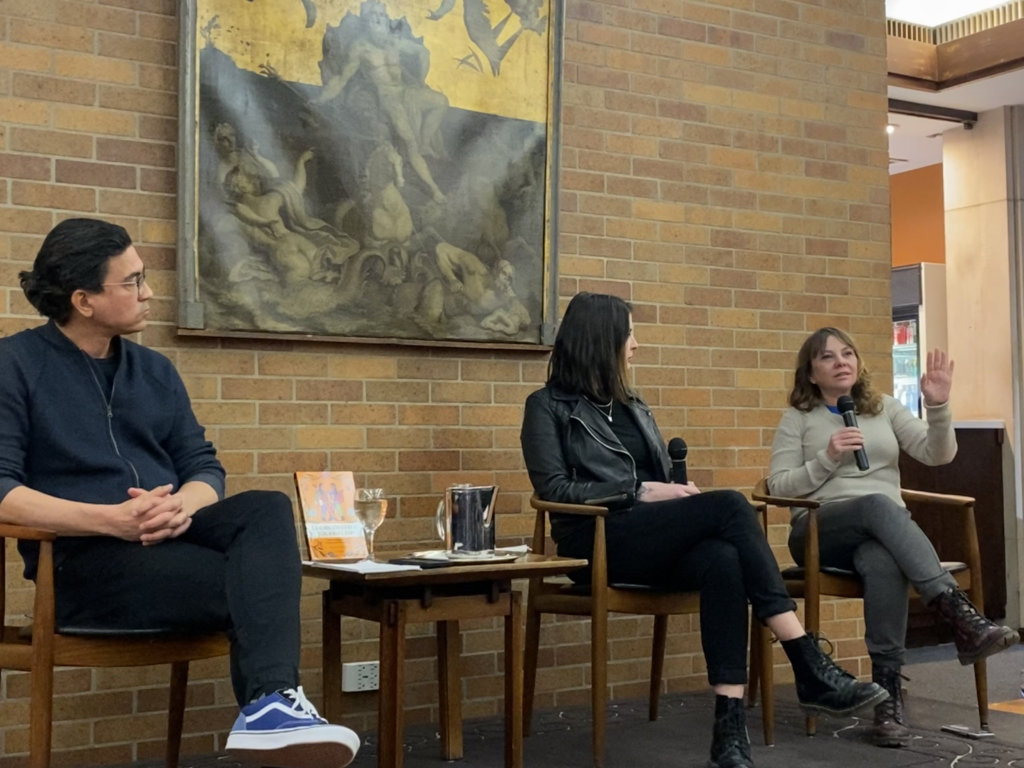
“What does it mean to decolonize journalism?” This is how Duncan McCue (Anishinaabe from the Chippewas of Georgina Island First Nation), a TMU Roger’s visiting journalist and a CBC broadcaster for over two decades, opened up the discussion at the launch for his book Decolonizing Journalism: A Guide to Reporting in Indigenous Communities.
Rhiannon Johnson an Anishinaabe journalist and CBC producer, and Karyn Pugliese (Pabàmàdiz), an Algonquin broadcast journalist and communications specialist, now editor-in-chief of Canada’s National Observer, joined McCue on the stage in Massey College’s Junior Common Room to discuss this new guide that offers practical tips and advice for reporting on Indigenous stories.
In 2011, McCue launched an online guide for Reporting in Indigenous Communities (RIIC), which has since become a resource that is frequently used in Canadian journalism schools and newsrooms. “But it needed to be updated,” McCue told the audience.
Since RIIC was originally launched, the TRC’s Call to Action #86 and movements like Idle No More and Black Lives Matter have left lasting impacts on the mainstream media. It is an expectation that newsrooms will continue to improve coverage on Indigenous Peoples in Canada, along with educating reporters on trauma-informed reporting and how to follow best practices for reporting in Indigenous communities.
During the COVID-19 pandemic, Oxford University Press reached out to partner with McCue, to create an updated version of his guide to reporting in Indigenous communities. McCue said that a good portion of his time throughout the pandemic was spent working on Decolonizing Journalism. The new guide has updated information on stereotypes and terminology along with trauma-informed reporting, journalistic objectivity, reconciliation journalism and tips for how to use social media in Indigenous communities.
McCue, Johnson and Pugliese discussed how it is important for journalism schools and newsrooms to follow Call to Action #86, to educate reporters on the history of Indigenous Peoples in Canada, and how journalism has portrayed and represented Indigenous communities in the media. In the past, Canadian media has often misrepresented and perpetuated harm through its coverage or lack of coverage of Indigenous Peoples.
Recalling one of the interviews he did for the “Teachings” section in the updated guide, McCue said that one of his friends and an award-winning journalist, Tristan Ahtone, questioned whether it is even possible to decolonize journalism. At the book launch, Johnson was more hopeful. She said, “Indigenous journalists are creating higher standards and helping shape the way our stories are being told which is helping to decolonize journalism.”
But it is not solely the responsibility of Indigenous journalists to ensure that newsrooms are properly reporting on and representing Indigenous communities. Pugliese discussed how non-Indigenous reporters used to believe that they were on the sidelines of reconciliation, just reporting on it. However, Pugliese said, “Journalism is not a reconciliation-free zone.”
McCue writes in the foreword to his new book about how he has heard stories of reporters “hiding under desks” when editors were assigning a story that would cover Indigenous perspectives, issues or events. It’s an ongoing problem: it can be intimidating to walk into an unfamiliar community or space.
In an interview for the School of Journalism, McCue said “The goal of the guide was to try to be really practical about the day-to-day challenges that journalists find themselves in when they’re reaching out to Indigenous communities to do news stories, and also to try to explain some of the cultural protocols to help journalists have kind of a baseline of cultural competency when it comes to dealing with Indigenous people.”
Decolonizing Journalism: A Guide to Reporting in Indigenous Communities is a great resource for Canadian journalism schools and newsrooms to educate reporters and to help them learn the best practices for reporting in Indigenous communities. And education, which McCue describes in his guide as “the process of deconstructing and dismantling the structures and practices in the media that perpetuate colonial ideals and privilege,” is the first step to decolonize journalism.
Decolonizing Journalism: A Guide to Reporting in Indigenous Communities is now available for purchase including on Amazon and GoodMinds.
